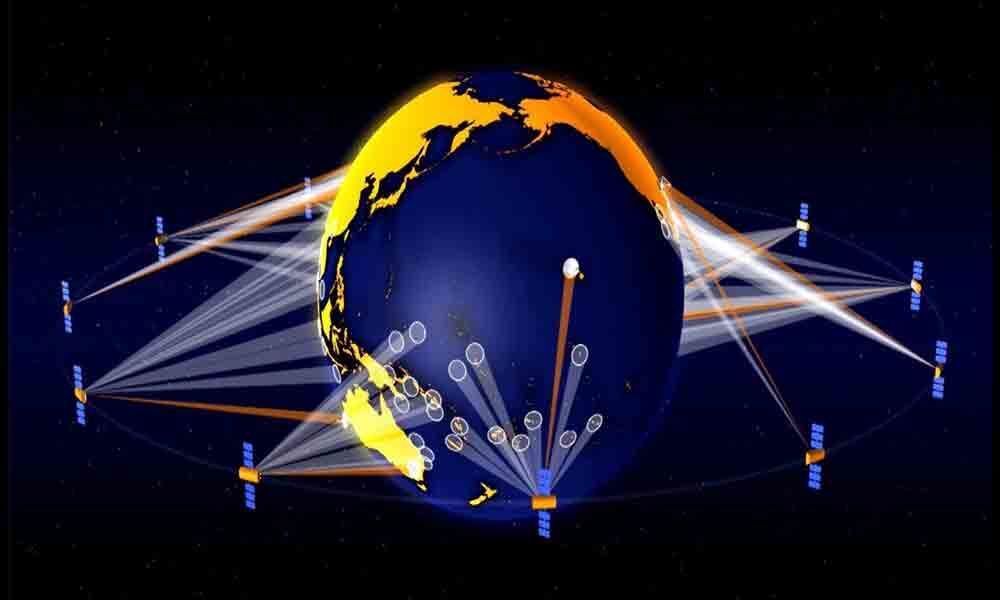Live
- Amit Shah should quit; demand MP, MLA
- Hike in support price brings cheer to coconut farmers
- Apple's Face ID Smart Doorbell Could Unlock Doors by Late 2025
- Amit Shah must tender apology
- Govt’s focus on rural and tribal health: Minister Damodar
- Ramanujan’s birth anniversary celebrated
- Former Chief Minister Y.S. Jagan's Four-Day Tour of Kadapa District Starting on 24th December
- Speeds up brain aging in women
- Horoscope Today, December 23, 2024: Get Daily Astrological Predictions for All Zodiac Signs
- Kichcha Sudeep’s High-Octane Action Thriller ‘Max’ Trailer Drops, Telugu Release on December 27
Just In

SpaceX postponed a launch of 60 satellites into low-Earth orbit that was scheduled for last night, possibly until next week, citing a need for software updates.
SpaceX postponed a launch of 60 satellites into low-Earth orbit that was scheduled for last night, possibly until next week, citing a need for software updates.
The SpaceX Falcon 9 rocket launch from Cape Canaveral was to be the first of potentially thousands in its Starlink project to beam broadband internet across the planet. "Standing down to update satellite software and triple-check everything again," said a tweet from the official SpaceX account. "Always want to do everything we can on the ground to maximize mission success, next launch opportunity in about a week."
The launch, which was initially envisaged for Wednesday, was first delayed because of high winds. Billionaire Elon Musk's firm, which is leading the private space race when it comes to rocket launches, is now looking to seize a chunk of the future space internet market. The launch will make it an early forerunner, along with rival OneWeb, a startup, but well ahead of Amazon's Project Kuiper, the brainchild of Musk's space rival Jeff Bezos. Musk is hoping to grab three to five per cent of the future global market, a figure he shared Wednesday during a call with reporters. That could earn SpaceX an eye-watering USD 30 billion a year, more than ten times what rocket launches make, he added.
The goal is to finance the development of future rockets and spacecraft, to realize the boss's dream of colonizing Mars. Each of the satellites weighs just 227 kilograms (500 pounds) and was built in-house in Redmond, near Seattle. The second stage of the rocket will begin to release them one hour after launch, at an altitude of 270 miles (440 kilometres), and then the satellites will use their thrusters to take up their places in a relatively low orbit of 340 miles (550 kilometres). That's slightly higher than the International Space Station, but well below the majority of terrestrial satellites, the highest of which sit in a geostationary orbit of 22,400 miles (36,000 kilometres).
The advantage of being so low is reduced lag times, key for broadband connectivity. The disadvantage though is more satellites are required to cover the globe, and, being closer to the atmosphere, they fall back to earth faster, after a few years. SpaceX will therefore have to replace them regularly - something that only became realistic from a price perspective recently with the rapid decline in the cost of manufacturing satellites and the development of mini-satellites. SpaceX has obtained approval from the US government to launch up to 12,000 satellites, at varying levels of orbit, but Musk said Wednesday that a thousand would be enough for it to be "economically viable." Starlink will become operational once 800 satellites have been activated, which will require a dozen more launches.

© 2024 Hyderabad Media House Limited/The Hans India. All rights reserved. Powered by hocalwire.com







